Key takeaways:
- Pro-life advocacy emphasizes the value of all human life and supports women through resources like counseling and community aid.
- Engagement in local politics is crucial for influencing policies; personal stories foster collective action and build connections.
- Building coalitions requires understanding diverse perspectives and emphasizes the power of storytelling to inspire action and unity.
- Sharing personal experiences can profoundly impact advocacy efforts, transforming individual narratives into powerful tools for change.
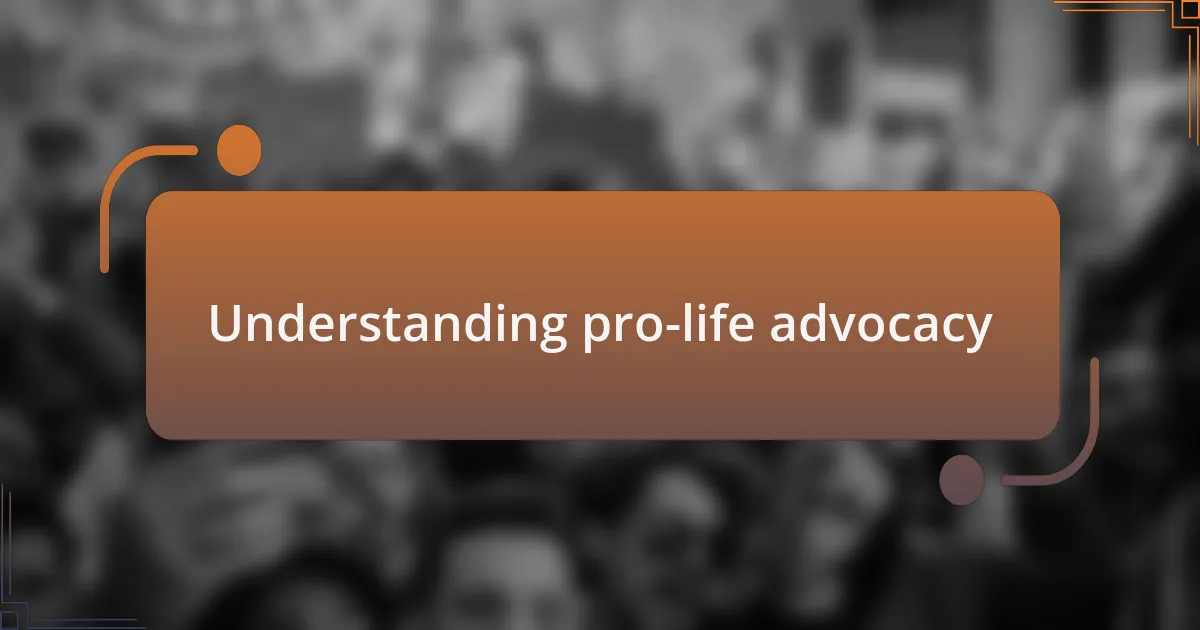
Understanding pro-life advocacy
Pro-life advocacy, at its core, is about the profound belief in the value of every human life—born and unborn. I remember attending a local event where a mother shared her story about choosing life despite challenging circumstances. Hearing her emotional journey made me reflect on the incredible strength individuals can find when faced with tough decisions.
Understanding pro-life advocacy also involves acknowledging the diverse perspectives within the movement. Have you ever considered how personal experiences shape our views on this sensitive topic? For me, engaging in conversations with people who hold varying beliefs has deepened my appreciation for the nuances involved. It’s not just about being anti-abortion; it’s about advocating for the support systems that empower women to choose life.
Moreover, the pro-life movement often focuses on providing resources like counseling, financial aid, and community support to mothers in need. During one community outreach event, I witnessed firsthand how providing a safe space and basic needs can change lives. It made me realize that to truly champion life, we must not only advocate for the unborn but also uplift and support those navigating the complexities of pregnancy.
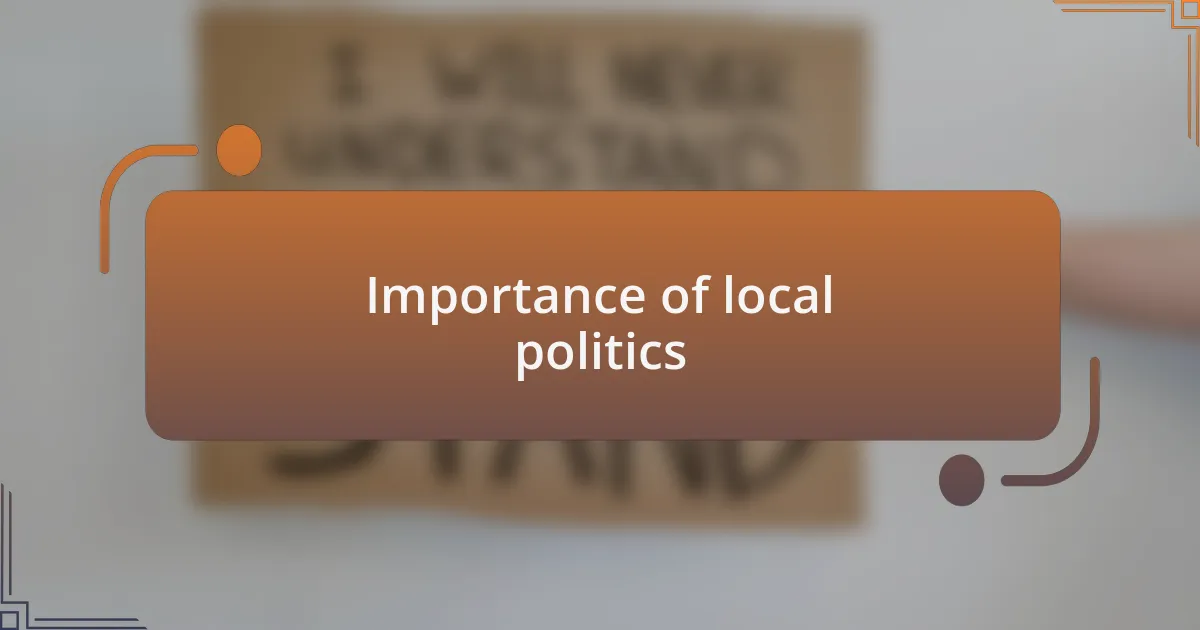
Importance of local politics
Engaging in local politics is essential because it allows us to influence decision-making processes that directly affect our communities. I recall a town hall meeting where I voiced my concerns about a proposed amendment that could impact abortion policies. The moment felt pivotal, as I recognized the power of my voice in shaping the rules that govern our lives.
Local politics are where change begins, and each election presents an opportunity for us to advocate for pro-life values on a relatable level. I remember canvassing my neighborhood and chatting with residents about the importance of voting for candidates who prioritize family and life. Each conversation revealed personal stories that connected our values with the broader community, reinforcing how individual perspectives can spark collective action.
Understanding the importance of local politics is about building connections and fostering genuine relationships. I’ve often thought, how many people have I inspired simply by sharing my passion? When I took the time to listen to the concerns of others in my community, I found common ground that ignited a shared commitment to advocate for policies that protect life.
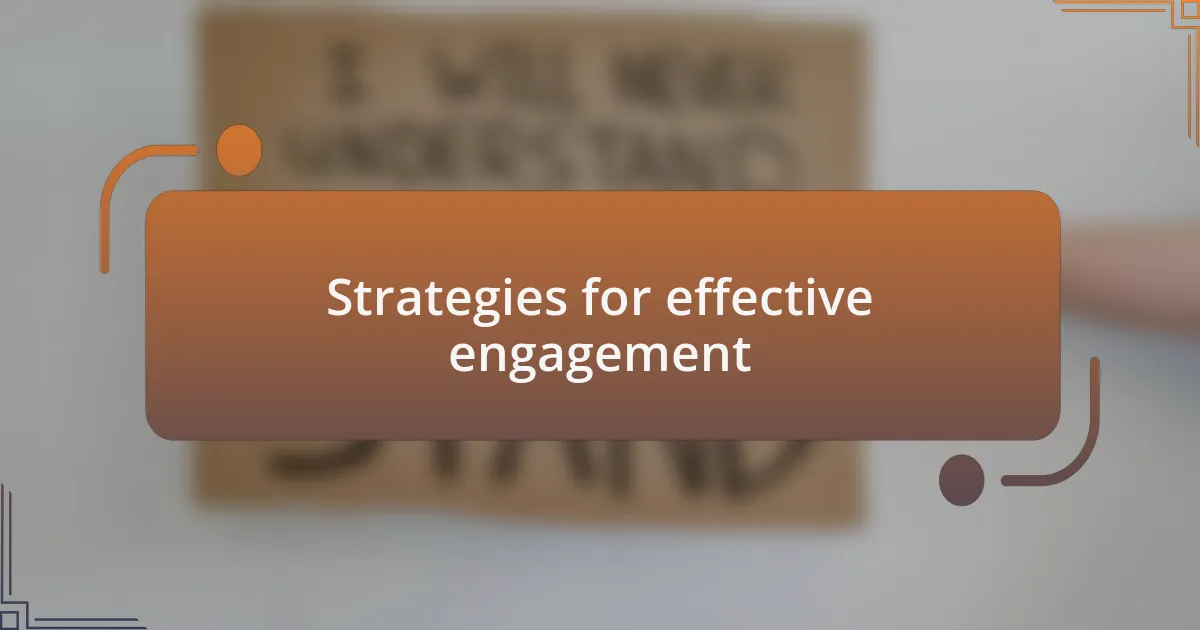
Strategies for effective engagement
Effective engagement in local politics hinges on creating open lines of communication. I remember a particularly impactful conversation during a community gathering where I approached a local leader after her speech. We discussed how our shared pro-life values could influence upcoming legislation, and it struck me how simply reaching out can open doors to collaborative efforts. Have you ever felt that moment when a simple question sparks an important dialogue? It’s in those exchanges that real connections form.
Joining local advocacy groups has also been a game changer for me. During one meeting, I met individuals who shared their personal stories about the impact of local policies on their lives. These connections turned into a powerful network of support, making our voices louder as a unified group. This experience showed me that when we come together, we amplify our message and create a stronger presence in local politics.
Another strategy is to leverage social media as a tool for engagement. I once organized a digital campaign focused on a critical local issue, and it was fascinating to see how many people interacted with our posts, sharing their thoughts and experiences. Questions like, “What does being pro-life mean to you in our community?” resonated deeply with locals, igniting conversations that transcended the digital space. This taught me that engaging online can help build a vibrant community and motivate action beyond traditional meeting spaces.
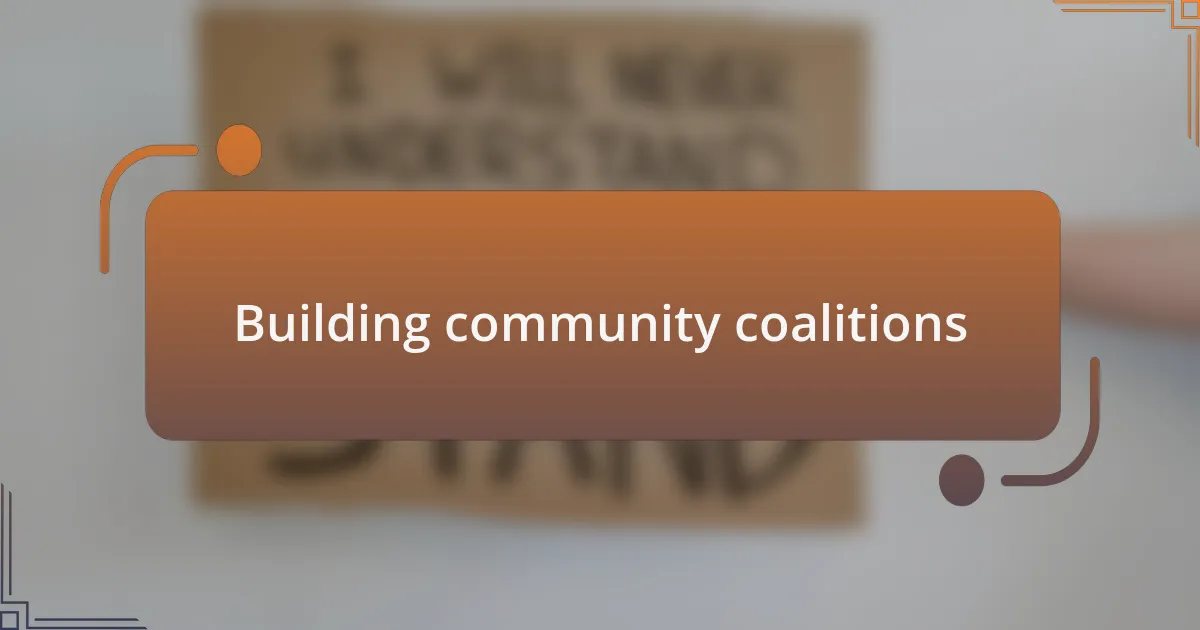
Building community coalitions
Building community coalitions requires a deep commitment to understanding the diverse perspectives within your locality. I vividly recall a Saturday morning when I attended a brunch hosted by a grassroots organization. It wasn’t just about discussing pro-life issues; it was about listening to the varied experiences of others and recognizing how those experiences shape our collective goals. Have you ever been in a room where every voice matters? That feeling of unity and purpose can be incredibly energizing.
One impactful moment came when we decided to collaborate with a local church to address community concerns surrounding women’s health services. By pooling our resources and networks, we managed not only to hold informative sessions but also to create a safe space for conversations that many had been hesitant to initiate. This experience highlighted to me that coalitions thrive when they prioritize shared values over differences. How often do we miss opportunities by focusing solely on individual agendas instead of coming together for a common cause?
As I navigated building these coalitions, I learned the power of storytelling in drawing people together. When I organized a town hall meeting where individuals could share their journeys related to unexpected pregnancies, I was struck by the emotional resonance of those narratives. Each story was different, yet there was an undeniable thread of hope and resilience that bonded us. Isn’t it remarkable how personal stories can transform an abstract issue into something deeply relatable and urgent? These moments reinforce the idea that community coalitions are not just about numbers; they are about building relationships that inspire action.
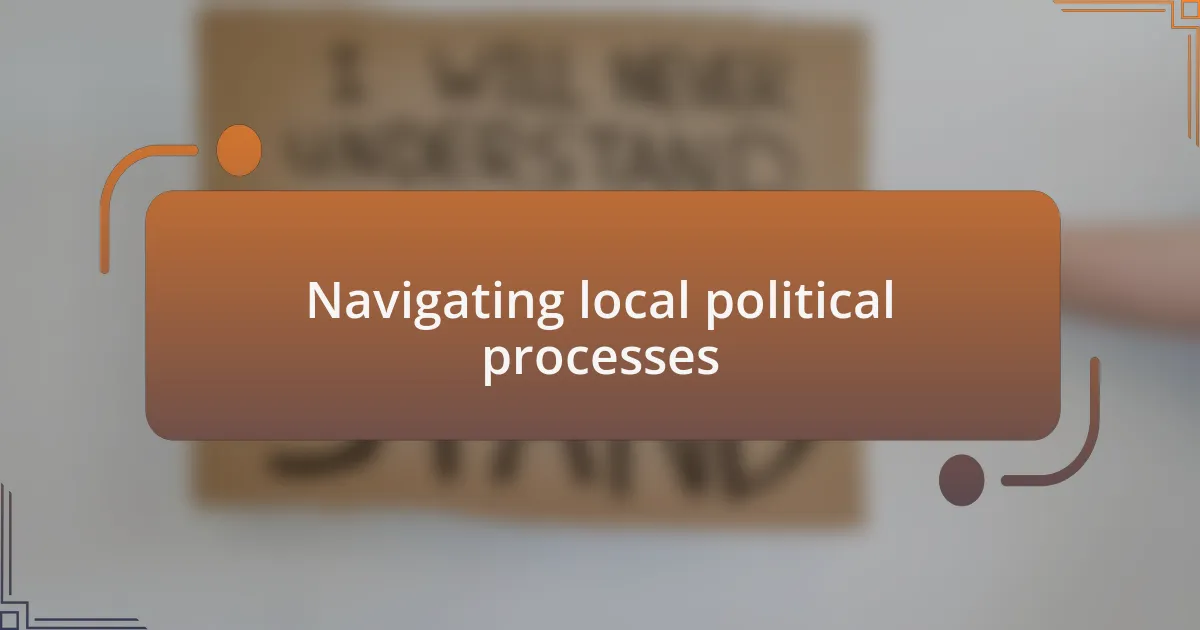
Navigating local political processes
Engaging with local political processes often feels like stepping into a maze. I recall attending a city council meeting for the first time, feeling a mix of excitement and intimidation. Watching how individuals navigated the agenda, from presenting proposals to engaging in passionate debates, opened my eyes to the intricacies of local governance. Have you ever felt that spark of empowerment when your voice is heard? It made me realize that being active in local politics requires not just presence but preparation and confidence.
One memorable experience was when I decided to run for a position on a community advisory board. I spent hours researching, attending meetings, and connecting with other members to understand the nuances of the political landscape. It was daunting, but I learned that the more informed I became, the more effectively I could advocate for pro-life issues. I often think about how crucial it is to persist, even when the process feels slow and challenging. How can we expect change if we’re not willing to engage fully in the system?
As I formed relationships with elected officials, I discovered the importance of consistent communication. I remember a particular instance where I reached out to a local representative about a potential policy change that could impact women’s health services. Instead of simply sending an email, I requested a coffee meeting. That personal touch deepened our connection and allowed for a more meaningful discussion. Isn’t it fascinating how taking the time to build rapport can lead to impactful advocacy? Each small step in navigating local politics can have rippling effects, shaping not only policies but also the community’s awareness and support for vital issues.
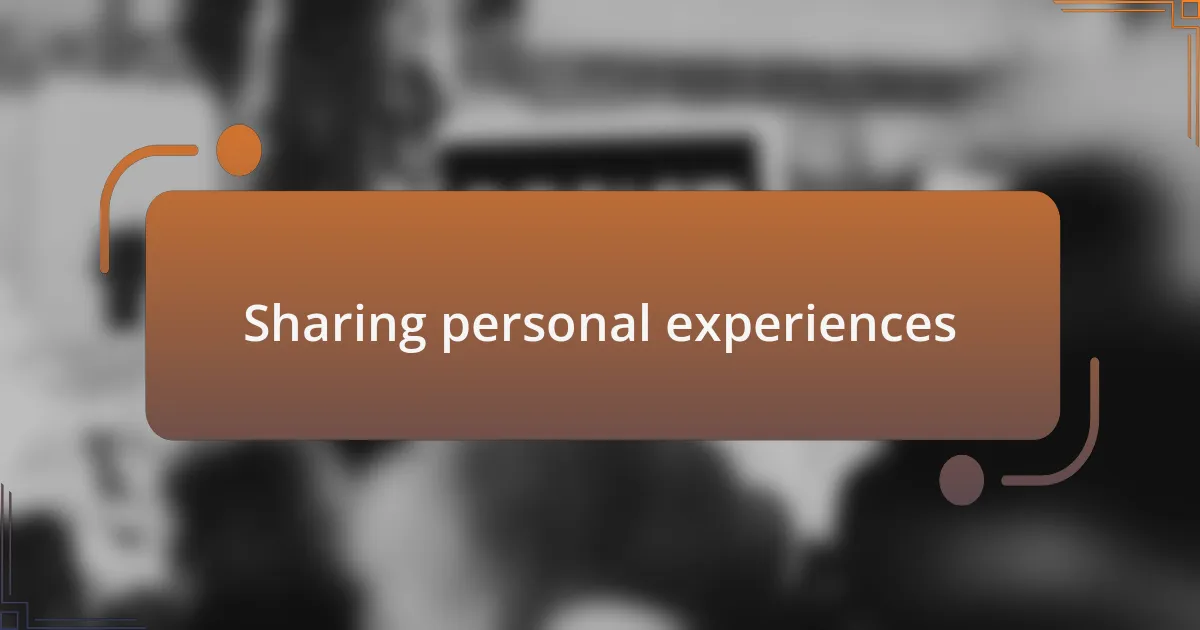
Sharing personal experiences
One experience that stands out to me is attending a community forum where our local representatives were discussing upcoming legislation. I vividly remember sitting among residents who expressed their concerns and hopes. Each personal story shared that night resonated deeply, and I couldn’t help but reflect on how these narratives shape the political landscape. Have you ever felt the sense of unity that comes from sharing a common goal? It made me realize that personal experiences are not just anecdotes; they are powerful tools that can influence decision-making.
Another time, I decided to share my journey in a local newsletter. Writing about my experiences with pro-life advocacy helped me connect with others who shared similar values. I was amazed by the flood of responses from people who felt empowered to join the cause. Isn’t it incredible how stories can inspire action? This reinforced my belief that every voice matters, and by sharing our individual journeys, we create a collective strength that can drive meaningful change.
During a particularly challenging debate about healthcare policies affecting women, I looked around the room and saw the diverse emotions on people’s faces—frustration, hope, and determination. I took a moment to share a personal story about a friend’s struggle in accessing health services. The room shifted in energy, and for a moment, we were all reminded of the human element behind the politics. Isn’t it enlightening how a single story can transform the atmosphere and lead to a deeper understanding? That experience solidified my commitment to weaving personal narratives into advocacy efforts, showing that our stories are a vital part of the broader conversation.
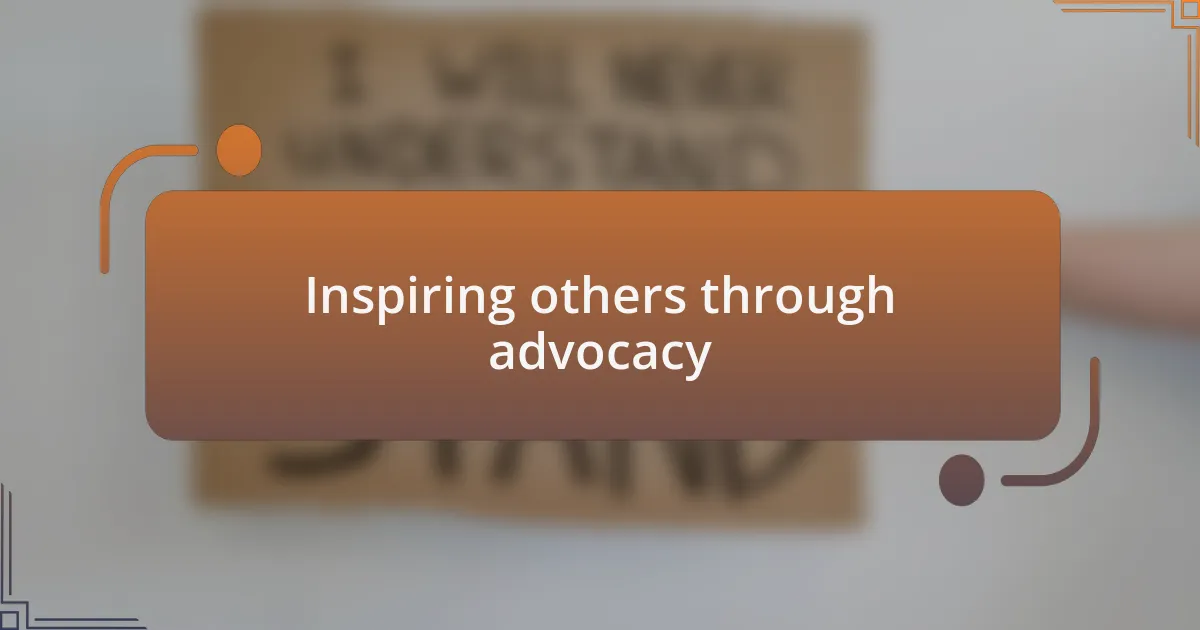
Inspiring others through advocacy
Advocacy doesn’t just inspire action; it sparks change in ways I never anticipated. At a local rally, I watched as a young woman stood up to share her experience with an unplanned pregnancy. Her courage was infectious; it ignited a fire in the crowd, encouraging others to step forward and voice their own experiences. Isn’t it fascinating how one brave act can ripple into a wave of collective empowerment?
I recall a moment when I was volunteering at an outreach event, engaging with families about the resources available in our community. One mother approached me, sharing her fears about her upcoming pregnancy amidst societal pressures. After listening to her, I realized we were not just exchanging information; we were building a bridge of trust and support. Those conversations made me see firsthand how advocacy can uplift individuals and foster a network of shared resilience. Have you thought about how your own words might uplift someone else in their journey?
In another instance, I led a workshop on effective storytelling in advocacy. As participants shared their tales of struggles and triumphs, I felt a wave of camaraderie wash over the room. It was clear that each story forged a path toward deeper understanding and connection. Why do we hesitate to share our truths? Often, I find that vulnerability in these moments becomes the thread that ties us together, reinforcing the idea that we all play a crucial role in inspiring change and amplifying each other’s voices.